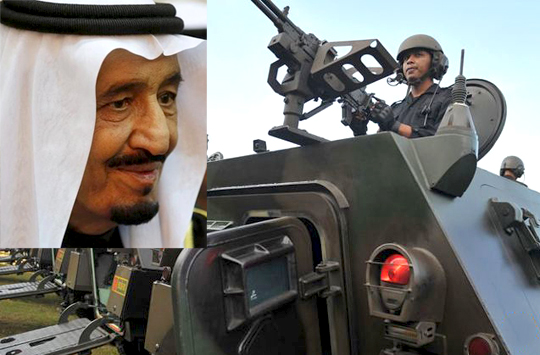Indonesia, Mar 4: A Bali beach holiday for Saudi Arabia's King Salman and his considerable entourage has turned into a military exercise for host Indonesia. The octogenarian monarch and his entourage of 1,500, including 25 princes and 10 ministers, flies on Saturday to Indonesia's Bali island aboard nine passenger jets for a private vacation. They will be guarded by at least 2,500 police and military personnel, as well as naval vessels parked offshore.
The king's Boeing 747-jet will be met at the airport by his usual gold coloured escalator. Flown in ahead of the visit were two plane loads of cargo, including plates, carpets and two bullet-proof Mercedes, said customs official Budi Harjanto.
King Salman's tour of Asia aims to build the kingdom's ties with fast-growing Asian economies and drum up investment to diversify the Saudi economy away from dependence on oil. The extravagance of his official trip, punctuated by holidays, comes after an austerity drive at home caused by low oil prices.
On the white sand beach in front of Bali's St. Regis resort, one in a row of five-star hotels where the Saudis will stay, two metre (7-foot) high screens have been put up to shield guests from prying eyes. A wooden staircase has been built for the royals to access the water.
“There will definitely be marine security because there's a section of beach where the (king) will be staying,” said Bali's Udayana military chief Major General Kustanto Widiatmoko.
Widiatmoko said six ships would be deployed along with anti-terrorism police and snipers, adding he hoped security would not impinge on the Saudi group's privacy.
CONTROVERSIAL VACATIONS
The king's vacations have been controversial at times due to the disruption they caused. He cut short a 2015 French Riviera holiday after local outrage erupted when the public beach at Vallauris was shut and concrete poured on the sand for a temporary lift.
After kicking off his Asian tour in Malaysia on Feb. 26, King Salman will also visit Brunei, Japan, China, the Maldives and Jordan on his month-long swing through the region promoting the kingdom as an investment destination.
Asia's top oil supplier plans to privatise state assets, cultivate non-oil private sectors and open its markets to foreign investors, after a plunge in oil prices slashed state revenues and opened a gaping budget deficit. A hallmark of the plan is to sell shares in state oil giant Saudi Aramco, which Saudi authorities have said could raise up to $100 billion, in what would be, by far, the world's biggest listing.
The king's three-day state visit in Jakarta this week focused on building cultural and religious ties and promoting education, as well as efforts to contain radical Islam in the world's most populous Muslim country.
Secular Indonesia has grown increasingly concerned about security, after several attacks over the past year blamed on supporters of Islamic State.
Islamist militants bombed a nightclub in the Bali resort of Kuta in 2002, killed 202 people, most of them foreign tourists.
MIDDLE EAST TOURISM
Bali's business community is hoping the king's visit will encourage more Middle East tourists to visit the “Island of the gods”.
“When they find out that the king and his entourage have come to Bali, they will realise that Bali is a world-class tourist destination, so automatically they will think about coming to Bali as tourists too,” Ketut Ardana, chairman of the Bali branch of the Indonesian Travel Agents Association (ASITA) told Reuters.
Mila Artini, a representative for the Blue Bird taxi group at Bali's Ngurah Rai International Airport, said the Saudis had booked the group's entire fleet of limousines up until the end of the king's visit on March 12.
An additional 200 Mercedes limousines had been brought in from Jakarta for the visit, said Arif, a Muslim taxi driver, who said the Saudis would be welcome in predominantly Hindu Bali.
“The religion here is different, but that's no problem because there are also a lot of Muslims here. There's halal food in all areas,” he said.
Indonesia aims to more than double the number of Muslim tourists it received last year to 5 million by 2019, said the head of the Indonesian tourism ministry's Halal Tourism Development and Acceleration team.
“Other than the large number of potential visitors from Muslim countries, their spending power is also larger,” said Riyanto Sofyan, noting Muslim tourists spend around $1,700 per visit, compared to $1,100 on average by other foreigners.
CAMEL RIDES
On the approach to Nusa Dua, a peninsula on the southern tip of Bali where the king is staying, police in fluorescent vests checked cars at an impromptu checkpoint.
While not especially brought in for the Saudi visitors, the beach at Nusa Dua does have something to make the visitors feel right at home – camels.
Minarto, who runs camel rides in front of the Hilton Bali Resort, said the Saudi group had requested 100 half-hour rides.
“We're busy and they wanted too many. We only have a limited number of camels,” said Minarto, who looks after five camels brought in from Australia years ago.






Comments
Add new comment